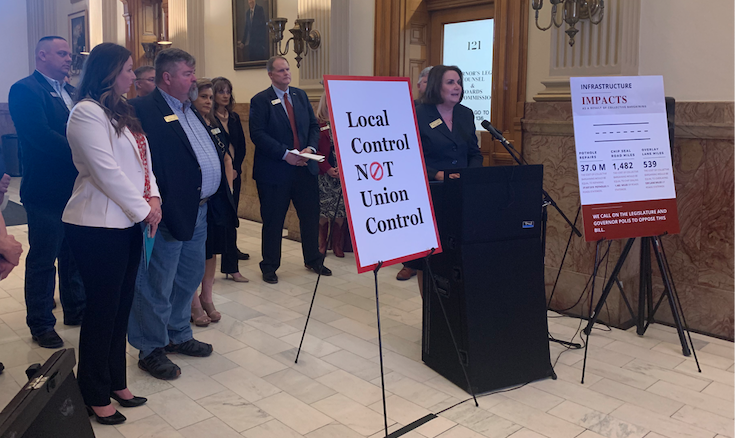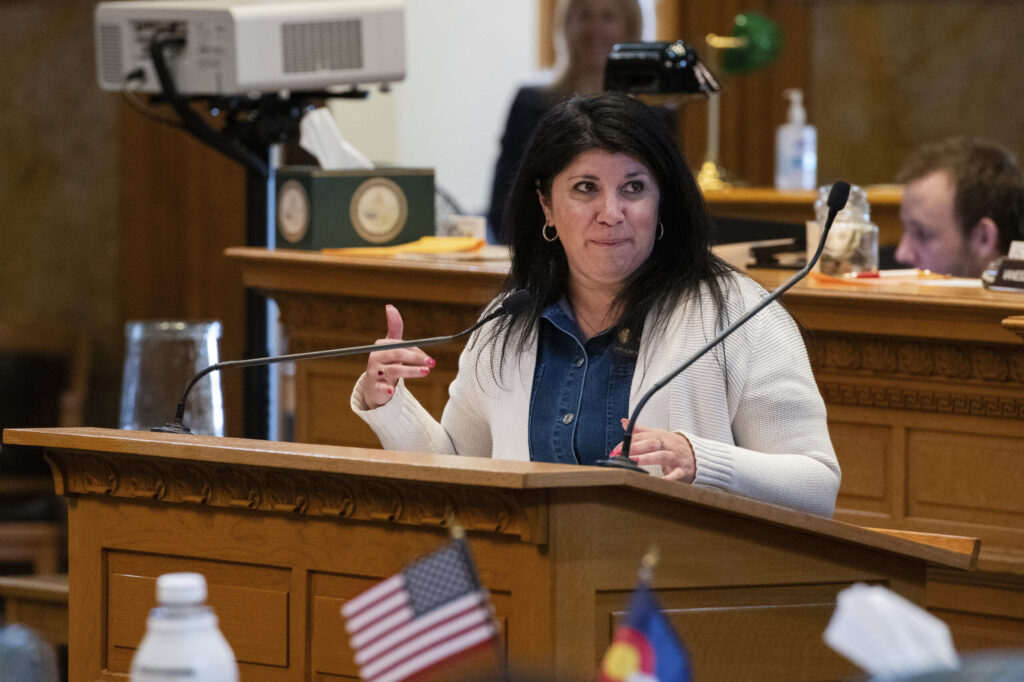Collective bargaining bill faces battle royale in the House

While the Senate managed to reach an agreement, more or less, on the bill to grant collective bargaining rights to most of the state’s 38,000 county workers, Republicans in the state House hope to put the bill on ice.
As amended, Senate Bill 230 largely made it optional for county commissioners to agree to collective bargaining contracts with their employees. Counties won major concessions on the bill from the Senate, prompted by news that Republicans planned push hundreds of amendments in an effort to drag out the process.
Some 450 amendments have now been drafted for the bill, sources said, including 25 that had already been introduced or adopted, and 250 that Senate Republicans abandoned after reaching an agreement with Senate Democrats. The debate is expected to start Friday afternoon and could continue late into the night and potentially into the session’s final weekend.
The bill, which has been in the works for at least two years, started out as a plan to allow all public sector employees to engage in collective bargaining. That would have included those who work for municipalities, counties, special districts, K-12 schools and public colleges and universities. As the bill got closer to introduction this year and the opposition grew, including from some quarters in organized labor, the bill was narrowed down first to just counties and higher education, and then to its final version, which only applies to counties.
Five counties – Adams, Summit, Pueblo, Pitkin and Las Animas – have collective bargaining agreement with their employees, although the agreement in Summit County is only with its transit workers. The bill is opposed by Colorado Counties, Inc., which represents 62 of the state’s 64 counties, and supported by Counties and Commissioners Acting Together (CCAT), a coalition of mostly Democratic county commissioners who negotiated the bill.
Concessions in the Senate version include throwing out a minimum size on bargaining units; in the bill as introduced, a unit would require a minimum of 50 employees. That wasn’t bad for the smallest counties, but representatives of larger counties wanted to avoid the cost of negotiating agreements with multiple units. The amendment would allow the size of the unit to be agreed upon by both the counties and workers. Disputes on that issue would send the matter to the state Department of Labor and Employment for resolution.
Another win for counties that fought the bill deals with whether counties had to accept a collective bargaining agreement at all. An amendment from co-sponsor Senate President Steve Fenberg of Boulder expanded the rights of a county when it’s discussing a collective bargaining agreement with workers. He told the Senate during debate on April 29 that the amendment “puts more guardrails” on what can and cannot be bargained in the bill’s section that lays out basic rights and responsibilities for county commissioners. Those rights, under the legislation, cannot be infringed on by a collective bargaining agreement.
Contracts could only be signed by county commissioners and not county administrators or managers under another change.
The bill’s implementation has also been delayed to July 1, 2023 and it now exempts the state’s two home rule counties.
Among the largest issues remaining for counties opposed to the bill is one not addressed by the legislation – the bill’s unfunded mandate. Any collective bargaining agreement would be negotiated by the bargaining unit, if approved by workers, and the county. That would require counties to hire human resource specialists or attorneys with experience in union negotiations. There could also be mediation, fact-finding and other related costs, and that all adds up to what could be a substantial expenses for county budgets, according to commissioners who testified on the bill in the Senate and House.
As an example of those costs, the 2020 bill setting up a collective bargaining agreement between the state and Colorado WINS, the state employee union, was estimated to require 48 more employees scattered across a dozen state agencies. The bill’s fiscal note pointed out that agencies would have to hire “specific human resources staff with labor relations expertise,” as well as administrative assistants, tasked with handling negotiations on department-specific agreements and ensuring compliance with the bill. Estimated cost for 2021-22 stood at more than $6.6 million, and that applied to just one union agreement. In the 2022-23 budget, another $8.8 million and five more employees are being added to address that agreement.
SB 230 does not provide funding to the counties to cover those anticipated costs, though it does provide the Department of Labor and Employment with $419,000 this year and $592,000 in the following year to hire more employees who would administer the collective bargaining process for counties through rulemaking, elections, and hearings.
The final issue for opponents is local control.
Eric Bergman of CCI told Colorado Politics that “the state is sticking their noses in and we can already do this.” He said county commissioners are hired to do the job of running their counties and don’t need the state’s help.
The House State, Civic, Military & Veterans Affairs Committee heard the bill on Thursday.
House Majority Leader Daneya Esgar, D-Pueblo, who sponsors SB 230 and who has championed legislation to unionize public sector workers for the past two sessions, told the committee Thursday that she believes public service workers deserve a voice on the job.
“(They) deserve the right to negotiate for fair and safe workplaces and quality public services,” she said.
Colorado is poised to double the amount of public employees able to collectively bargain with the addition of county workers, Esgar said.
She claimed that unions would reduce turnover and as a result save counties millions of dollars. During the pandemic, county workers kept public services going, but without a protected voice on the job, they can be fired if they raise concerns about unsafe working conditions, she said. A seat at the table will allow them to advocate for improvements at the workplace, which would give workers a reasons to stay on the job, she added.
The bill does not compel counties to spend any money or change their budget, she said, adding the counties retain full control of their budgets. Workers must first choose to organize, form a union and then negotiate the contract, but management rights are also protected, she said.
Commissioners representing CCAT, county clerks and recorders Paul Lopez of Denver and Gil Ortiz of Pueblo backed the bill in Thursday’s nearly five-hour hearing. So did union representatives and county workers in some of those unions.
Sheriff Tyler Brown of Arapahoe County, a member of the Fraternal Order of Police Lodge 31, spoke in favor of SB 230. He said implementing collective bargaining would not cost counties millions of dollars, adding, “You cannot squeeze a dollar out of 50 cents.” That’s something he said he knows from the budget process in his county.
Deputies are committed to the community and do not want to walk off the job, Brown said, adding they just want their voices to be heard. He told the committee his deputies can discuss their issues, and Brown can take it to the county commissioners, but they do not have a right to bargain and they seek that ability.
CCI, which has been opposed since the beginning, took heat from Rep. Andrew Boesenecker, D-Fort Collins, who pointed to a CCI fact sheet that said that, under SB 230, workers could walk off the job during a labor dispute. That, the CCI fact sheet said, could threaten the health and safety of the public. Boesenecker said he heard from county workers, who found the bill offensive.
“I have a hard time reconciling these statements,” Boesenecker said, referring to the idea that people who work with vulnerable populations, for example, could walk out.
Bergman said the bill creates the potential for an adversarial relationship that doesn’t currently exist. He also said the bill’s language on strikes isn’t clear – it says that an “exclusive representative” could not call a strike but doesn’t define the term. Esgar earlier said that term refers to the union itself, and that the language comes from the state union bill.
SB 230, which the House Appropriations Committee approved on Friday afternoon, now awaits a full House debate.

marianne.goodland@coloradopolitics.com












